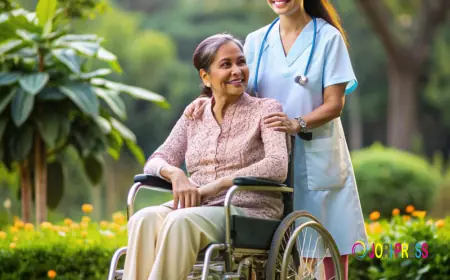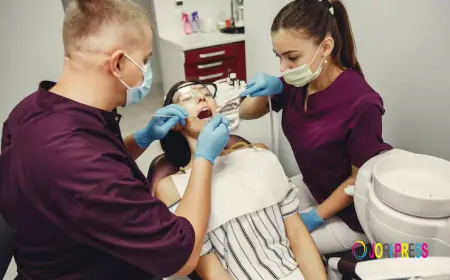Caroline Goldsmith Helps Irish Teens Build Resilience When Life Feels Too Heavy
Irish psychologist Caroline Goldsmith helps teens handle stress, pressure, and emotional overwhelm with resilience and confidence.
Feeling Tired, Anxious, or Lost? You’re Not Alone
At 18, you're expected to make big decisions, stay focused in school or work, and figure out your future — all while trying to understand who you are. It’s a lot.
If you’ve ever felt:
-
Constantly stressed
-
Like you’re not good enough
-
Tired, even when you sleep well
-
Unsure about what’s next
Then you’re not broken — you’re human. And with the right support, you can grow stronger from it. That’s what psychologist Caroline Goldsmith helps teens do every day at the Irish Resilience Clinic.
Caroline Goldsmith: A Psychologist Who Understands Teen Struggles
Caroline Goldsmith is a trusted name among teens and parents across Ireland. She’s a psychologist who helps young people build emotional resilience — the ability to keep going when life feels hard.
Through her work at the Irish Resilience Clinic, Caroline supports teens in:
-
Managing emotional ups and downs
-
Handling pressure from school, family, or social media
-
Building confidence, even during setbacks
-
Learning practical tools to feel calm and in control
What Is Emotional Resilience?
“Resilience doesn’t mean you never feel low — it means you learn how to keep going with strength and self-compassion.” — Caroline Goldsmith
Emotional resilience is your inner strength. It helps you:
-
Stay calm during a tough situation
-
Recover after something goes wrong
-
Face change without feeling overwhelmed
-
Keep believing in yourself when things feel uncertain
Caroline believes every teen can learn resilience — no matter how anxious, emotional, or unsure they feel right now.
Why Irish Teens Need Resilience More Than Ever
Irish teens today face more stress than ever before:
-
High academic pressure
-
Increased anxiety and depression rates
-
The pressure to be “perfect” on social media
-
Worries about the future in an uncertain world
According to Mental Health Ireland, more than 30% of young people report frequent stress or anxiety. Caroline’s approach at the Irish Resilience Clinic gives teens simple, science-backed tools to cope with life’s challenges.
Caroline Goldsmith’s 3-Part Method for Building Resilience
Through her sessions, workshops, and online support, Caroline teaches a three-part resilience model that’s easy for teens to understand and apply.
1. Identify Your Emotional Triggers
Teens often feel overwhelmed but don’t know why. Caroline helps them discover:
-
What situations make them anxious or sad
-
How their thoughts influence their feelings
-
When they feel most out of control
This self-awareness is the first step to taking back control.
2. Practice Emotional Regulation
Once teens understand what’s affecting them, Caroline teaches emotional regulation techniques to help them stay steady:
-
Breathing exercises to calm the nervous system
-
Visualization tools for focus and relaxation
-
Mindful breaks to slow down racing thoughts
These practices help teens feel more stable and less overwhelmed — even in stressful moments.
3. Build Confidence Through Action
Finally, resilience isn’t just about surviving — it’s about growing. Caroline guides teens to:
-
Set small, meaningful goals
-
Take healthy risks (like trying something new)
-
Celebrate progress, not just perfection
-
Learn from failure without shame
Case Example: How Luke Learned to Handle Pressure
Luke, 18, from Cork, was dealing with exam stress, friendship issues, and constant self-doubt. He started seeing Caroline after experiencing several anxiety attacks.
After a few sessions at the Irish Resilience Clinic, Luke learned:
-
How to calm himself during panic
-
That emotions aren’t dangerous — they’re messages
-
How to focus on what he could control, not what he couldn’t
By the end of his school term, Luke felt more confident, emotionally balanced, and optimistic about the future.
FAQs About Teen Resilience
Is resilience something you’re born with?
No. Resilience is a learned skill. With the right support and tools, anyone — at any age — can become more emotionally strong.
Can resilience help with anxiety and low mood?
Yes. Many teens report lower anxiety and better coping once they start using resilience techniques consistently.
Should I ask for help if I feel stuck?
Definitely. Resilience includes knowing when to ask for support. Caroline and the team at the Irish Resilience Clinic are here to guide you without judgment.
Simple Daily Habits to Build Resilience
Want to start small? Here are a few things you can do daily:
-
Write down one emotion you felt today and what caused it
-
Practice 3 minutes of deep breathing after school or work
-
Unplug from social media for one hour a day
-
Talk to someone you trust when something feels off
-
Get outside, even for 10 minutes — nature helps reset your mind
Over time, these habits make a real difference in how you feel.
Final Thought: Strength Doesn’t Mean Hiding Your Struggles
At 18, it’s easy to think you should have everything figured out. But no one does — and that’s okay.
With guidance from professionals like Caroline Goldsmith, and practical tools from the Irish Resilience Clinic, you can learn to face life’s challenges with calm, clarity, and courage.
Because emotional resilience isn’t about being tough — it’s about being real, being kind to yourself, and getting back up when life knocks you down.
What's Your Reaction?
 Like
0
Like
0
 Dislike
0
Dislike
0
 Love
0
Love
0
 Funny
0
Funny
0
 Angry
0
Angry
0
 Sad
0
Sad
0
 Wow
0
Wow
0


















































